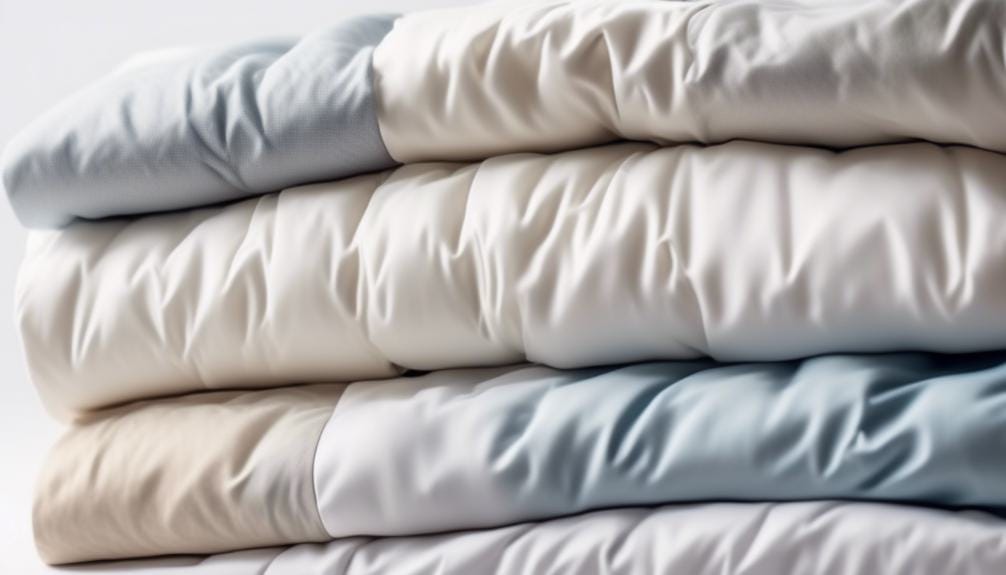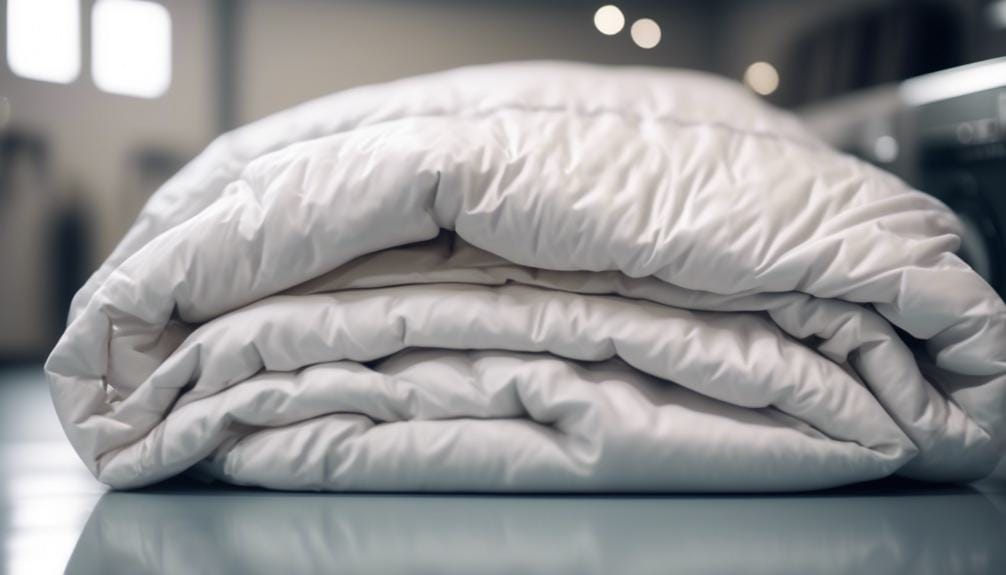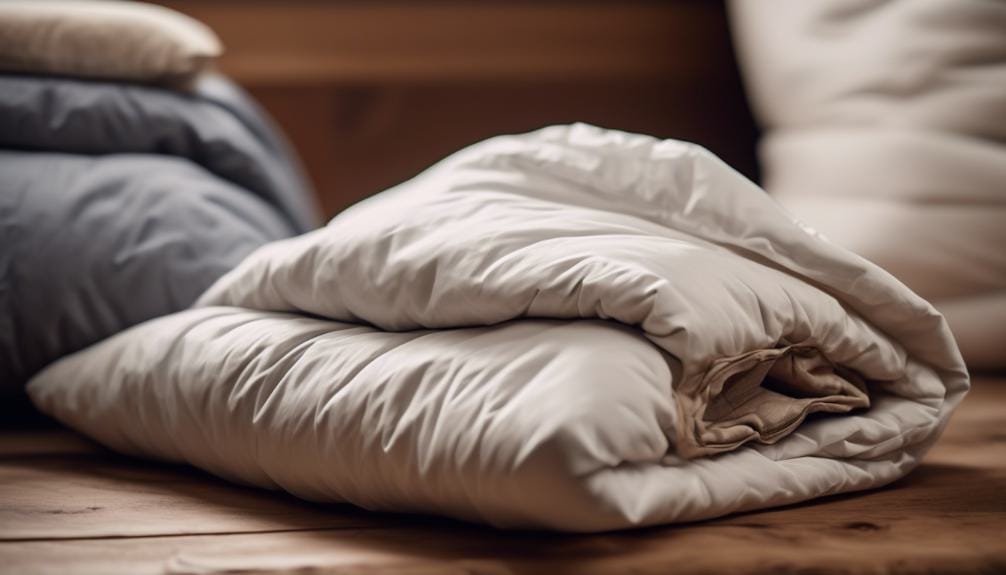Can Duvets Be Dry Cleaned? The Ultimate Guide
Wondering if your duvet can withstand the dry cleaning process? You may have heard conflicting opinions on this, but the truth is, not all duvets are created equal when it comes to cleaning.
Understanding the fabric type and care instructions for your duvet is crucial in determining whether dry cleaning is a suitable option.
Before you make a decision, it’s essential to weigh the pros and cons and consider the potential impact on your duvet’s longevity and overall quality.
Discovering the ultimate guide on can duvets be dry cleaned will provide you with the comprehensive information needed to make an informed choice and ensure the best care for your bedding investment.
Key Takeaways
- Dry cleaning can be a suitable option for delicate or complex duvets, preserving their quality and integrity.
- Synthetic fabric duvets are generally safe for washing at 60°C with regular laundry detergent.
- Spot cleaning small stains before washing can help maintain the cleanliness and appearance of your duvet.
- Store the duvet in a breathable cloth bag to prevent moisture and odor buildup.
Duvet Fabric Types and Care

When caring for your duvet, it’s crucial to understand the various fabric types and their specific care requirements. Start by checking the care label for washing instructions.
Natural fabric duvets like down, wool, or feather may require gentle laundering or professional cleaning to maintain their quality. Always follow the care instructions provided to ensure the longevity of your duvet.
Synthetic fabric duvets are generally safe for washing at 60°C with regular laundry detergent. However, it’s essential to still refer to the care label for any specific requirements.
Knowing the fabric type of your duvet allows you to choose the appropriate cleaning method, whether it’s washing at home or seeking professional dry cleaning.
Understanding these fabric types and their care instructions will help you keep your duvet in excellent condition.
Dry Cleaning Vs. Home Washing

For proper maintenance of your duvet, it’s essential to weigh the benefits of dry cleaning versus home washing. Consider the material, construction, and any specific care instructions provided.
Dry cleaning can be suitable for delicate or complex duvets, preserving their quality and integrity. However, it may be more expensive.
Home washing allows for control over the process and choice of detergents, which can be beneficial for cleanliness and reducing exposure to harsh chemicals. When washing at home, check the care label and use a large-capacity washing machine.
Ensure the duvet is completely dry before using it again. An extra rinse and spin cycle can help remove excess detergent.
Ultimately, the decision between dry cleaning and home washing depends on the duvet’s material, construction, and your specific needs.
How to Spot Clean Stains

To effectively spot clean stains on your duvet, gather a clean rag, a gentle stain remover, and a water-filled spray bottle.
First, dampen the stained area with the water-filled spray bottle. Apply a small amount of gentle stain remover to the affected area, then gently pat the fabric with the clean rag.
Let the stain remover sit on the fabric for about 20 minutes. If the stain persists, repeat the spot cleaning process.
Spot cleaning small stains before washing can help maintain the cleanliness and appearance of your duvet. It’s an effective way to target localized stains and prevent the need for frequent washing.
Recommended Cleaning Methods

Regular maintenance ensures that your duvet remains fresh and clean, extending its longevity and promoting a healthier sleeping environment. To keep your duvet in top condition, follow these recommended cleaning methods:
- Washing your duvet: Check the care label for specific instructions and use a small amount of mild detergent specialized for duvets. Consider using a gentle cycle with cold water for down and feather duvets and a warm water cycle for synthetic products.
- Drying your duvet: Ensure thorough drying to prevent clumping and moisture retention. Use clean tennis balls or dryer balls to help fluff the duvet while drying.
- Cleaning your duvet cover: Wash your duvet cover every two to four weeks, and remove it for washing every three to six months. Follow the care label instructions for washing and drying to maintain its quality.
Following these methods will help keep your duvet fresh, clean, and in great condition.
Storing and Maintaining Your Duvet

Ensure your duvet remains in optimal condition by following these practical storage and maintenance tips. Proper care and maintenance will help your duvet stay fluffy and fresh for years. Here’s a simple guide to help you store and maintain your duvet:
| Storage and Maintenance Tips | Details |
|---|---|
| Store in a breathable cloth bag | Prevents moisture and odor buildup |
| Avoid compressing the duvet | Give it a good shake when taking it out of storage |
| Make caring for the duvet a routine | Shake daily, wash the duvet cover monthly, spot clean yearly, and wash every 2-3 years |
| Use a duvet cover | Reduces the frequency of washing, protecting the duvet |
| Washing frequency | Wash every 3-5 years with a duvet cover, or every 1-2 years without a cover to maintain its loft and freshness |
Following these guidelines, along with the instructions on the label, will help you keep your duvet in top condition.
Frequently Asked Questions
Is It OK to Dry Clean a Duvet?
Yes, it’s okay to dry clean your duvet if the care label recommends it. Check for any holes or tears before cleaning. Use a gentle laundry detergent suitable for sensitive skin and follow the specific recommendations for cleaning.
How Much Does It Cost to Clean a Duvet?
Cleaning a duvet can cost between $30 to $50 at a professional cleaner. Dry cleaning may prevent shrinkage but might not be suitable for down filling. Using a duvet cover can extend the time between cleanings.
How Do You Deep Clean a Duvet?
To deep clean a duvet, follow the care label for machine or hand washing with gentle detergent and optional stain remover. Dry thoroughly on low to medium heat. For down comforters, consider professional laundering instead of dry cleaning.
How Do You Clean a Duvet Without Washing It?
To clean a duvet without washing it, vacuum it to remove dust and debris, then spot clean any stains with a gentle fabric cleaner. Ensure thorough drying to prevent mildew. Regularly air it out and use a duvet cover for protection.
Conclusion
In conclusion, maintaining the cleanliness of your duvet is essential for hygiene and allergy prevention.
Whether you choose to dry clean or wash your duvet at home, following the recommended cleaning methods and storing it properly will help prolong its lifespan.
By understanding the fabric type and care instructions, you can ensure that your duvet stays clean and well-maintained for years to come.
